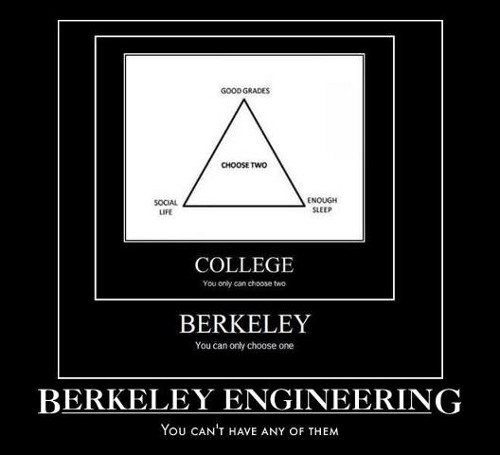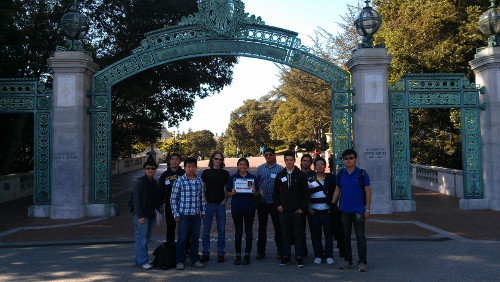UC Berkeley
How did I come to be accepted into the Electrical Engineering and Computer Science program at UC Berkeley’s College of Engineering? Take a wild guess. Word on the street is that the typical GPA for admitted transfer students is a 3.9–although this might have been the lower boundary for an admitted student and thus below whatever happens to be the real average. My final GPA from community college was a 3.86, which is a number that includes about a half dozen classes where I had unfortunately put in a minimal amount of effort (I got a B in History of Rock and Jazz, if that’s any indication). My math, science and other lower division classes for my major (such as English) consist of 89 units in total and accumulate to a 4.0 GPA. I was always attempting to be among the top performers in each of my classes so that I could effectively prepare for what was to come, because simply going after the A letter grade was not doing enough and in some ways meaningless. This is not grandstanding–I had to make some incredible sacrifices to even create the possibility of getting into a program like this.
Berkeley Engineering Motivational Poster
I had also applied to MIT and Stanford, and was for a while strongly considering moving out to the East Coast, but I was denied admission by both institutions. Like UC Berkeley, these are universities of the highest prestige, but I was still a bit surprised by these outcomes. For both I had to submit SAT scores–something that the University of California system does not require of its transfer students. I took the primary SAT exam along with the Math, Chemistry and Physics subject tests one time each over two separate sittings and with minimal preparation. I was already confident in being accepted to UC Berkeley so I elected to not devote the time required to go back and relearn a bunch of older material, much of which I hadn’t seen in years. Also, there are some fundamental issues in how these exams are designed and administered so I couldn’t really justify going to the great deal of trouble required to uncover all of the little “gotchas” that exist. I scored the following: 650 Critical Reading; 660 Mathematics; 550 Writing; 750 Chemistry; 590 Mathematics Level 2; and 660 Physics. This was the only aspect of each of my applications that could be considered as less than impeccable and I efforted to explain to the reviewers the legitimate reasons for why I chose not to prepare for these exams at the expense of my projects and other studies. Perhaps this was not such a good idea, but like I said, at this point I wasn’t too worried about where I would end up.
In an odd way the less than stellar SAT scores were incredibly consistent with the other parts of the applications I had prepared for both universities, and worked to reinforce how I presented my unique strengths. I had to submit and explain my high school transcripts, which I am fairly certain was a touch different than the types of high school transcripts both schools are accustomed to receiving. Also, when asked who were my favorite artists and musicians (yes, Stanford actually wanted to know this, and MIT had a few similar questions on its application as well) I put Nine Inch Nails and ZZ Top in place of the perhaps more “correct” answers of Beethoven and Bach. Alas, I was not the right candidate at the end of the day. I had labored to give a very honest and accurate representation of who I am on both applications so receiving denials was probably something working itself out; it makes sense to me in more than a few ways that I ended up at UC Berkeley. Having the option to go to MIT would have been pretty neat, though. I traveled to Boston years ago and made it a point to visit the campus while I was there, just because it felt like it was something that I should do.
So while I am at the College of Engineering at UC Berkeley for the next two and a half years I intend to spend my time studying nearly even amounts of both Electrical Engineering and Computer Science. Usually students will focus in one area over the other, but I’m going to try to split it right down the middle. As far as the Computer Science end of things is concerned, I have a much stronger foundation in place so it would be more natural and perhaps less difficult if I chose to make it my primary path. That said, I don’t feel that I need school as much to study programming because there are so many books out there covering every possible corner of Computer Science, plus the Internet is bursting with related tools and resources. Electrical Engineering is different because schools have access to equipment and other materials that are further out of reach for the average person. The concepts are also very challenging and incorporate greater amounts of theoretical math and science, so I have been drawn to the subject for these reasons in addition to my growing curiosity in the design of computer hardware.
CalSO Student Orientation
The two things that are most exciting to me as I write this are 01) the layer in a computer where the software interacts directly with the hardware, and 02) how hardware can be tailored to optimize the accessibilities and efficiencies of specific types of software applications. I suppose that I should also mention that language and compiler design, as well as verbosity of programming syntaxes, will also be a major focus of my studies.
Summer 2013 Semester
- CS61C — Machine Structures

- EE40 — Introduction to Microelectronic Circuits
Fall 2013 Semester (Tentative)
- EE20N — Structures and Interpretations of Systems and Signals
- CS47A — Completion of Work in Computer Science 61A
- CS47B — Completion of Work in Computer Science 61B
- EE105 — Microelectronic Devices and Circuits
- CS164 — Programming Languages and Compilers
Spring 2014 Semester (Tentative)
- CS70 — Discrete Mathematics and Probability Theory
- EE120 — Signals and Systems
- EE140 — Linear Integrated Circuits
- CS184 — Foundations of Computer Graphics
Fall 2014 Semester (Tentative)
- EE149 — Introduction to Embedded Systems
- CS169 — Software Engineering
- CS170 — Efficient Algorithms and Intractable Problems
- CS263 — Design of Programming Languages
Spring 2015 Semester (Tentative)
- EE141 — Introduction to Digital Integrated Circuits
- CS150 — Components and Design Techniques for Digital Systems
- CS264 — Implementation of Programming Languages
- Humanities Course I
Fall 2015 Semester (Tentative)
- EE130 — Integrated Circuit Devices
- CS152 — Computer Architecture and Engineering
- CS188 — Introduction to Artificial Intelligence
- Humanities Course II
Degrees
→ None



